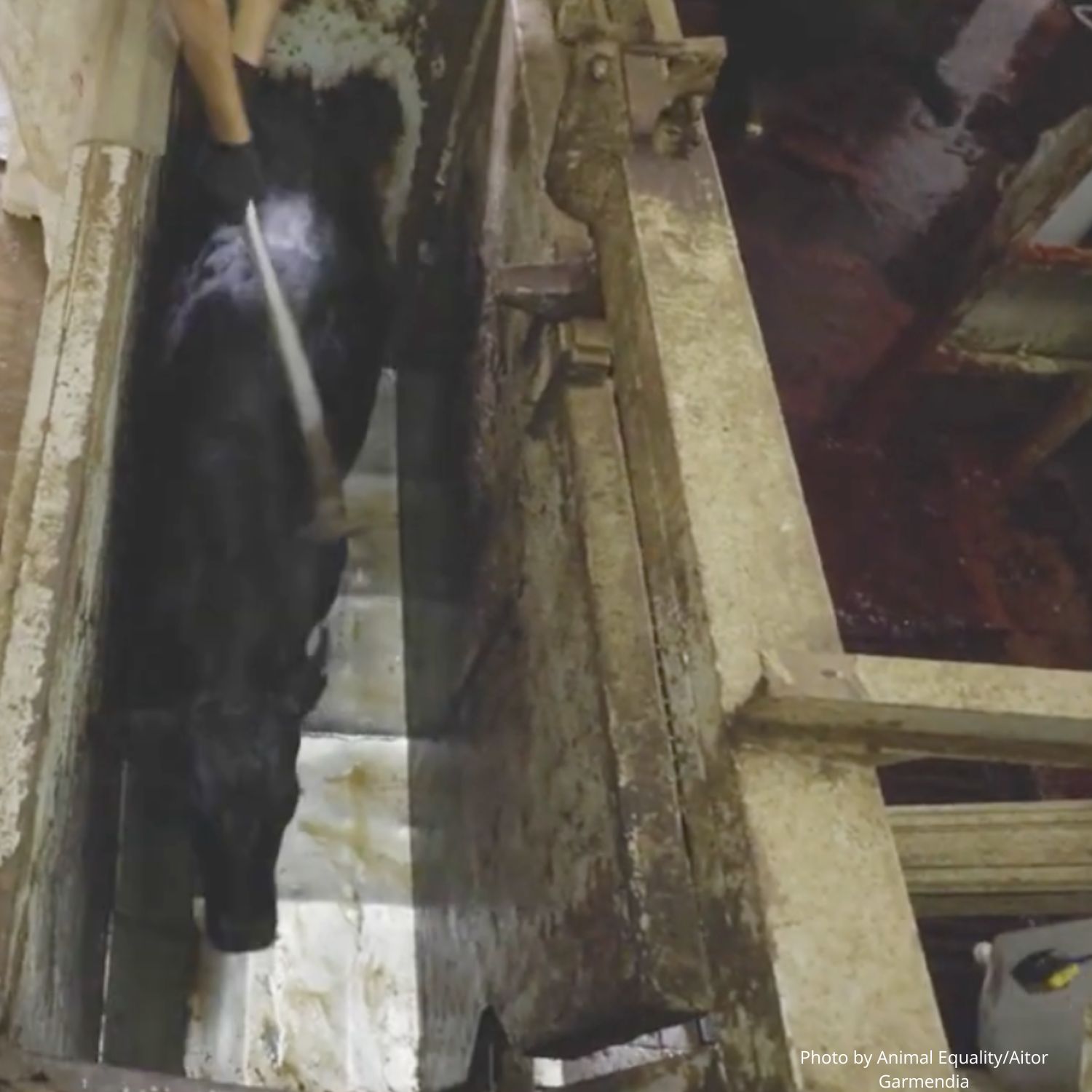Avian flu update: factory farming is a danger to animals and humans alike
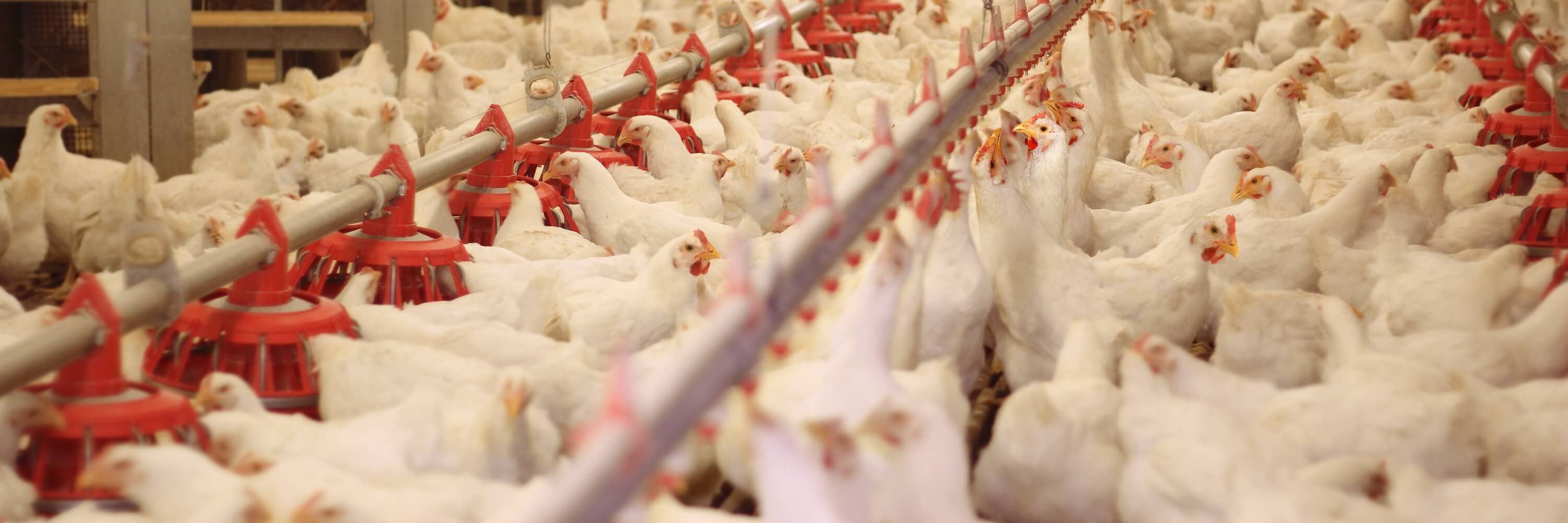
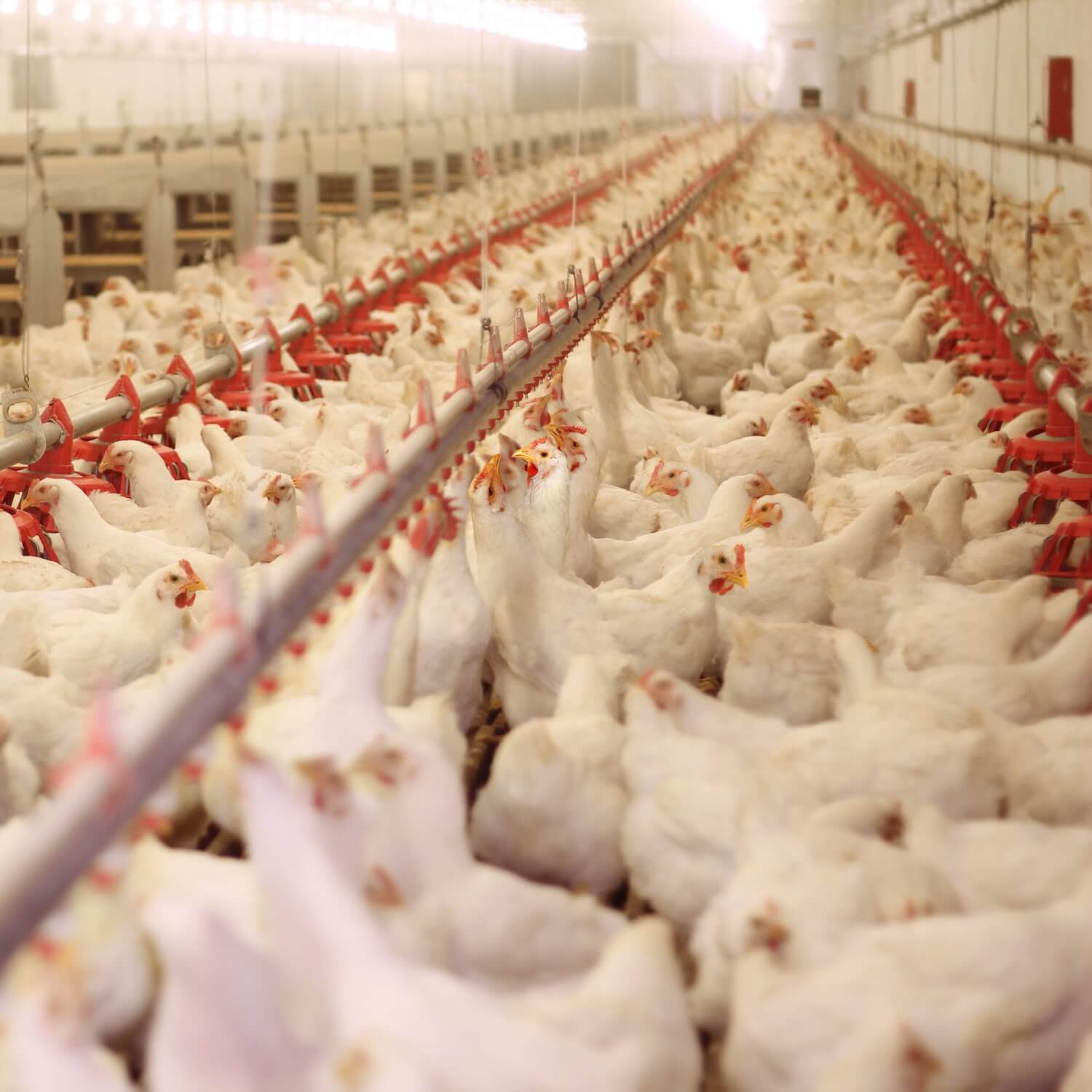
The news surrounding avian flu keeps coming, and the situation is becoming increasingly worrying.
Earlier this month, the US reported its first human death from H5N1 – a strain of bird flu, marking a significant and tragic milestone. This individual, over 65 and with pre-existing health conditions, passed away after being hospitalised in Louisiana in December. They became the first severe human case of this deadly strain in the country.
Now, in the UK, a farm worker in England has tested positive for H5N1, marking what’s believed to be only the second human case in the country since 2022. This comes as the European Centre for Disease Prevention and Control (ECDC) and the European Food Safety Authority (EFSA) issue scientific advice warning that avian flu viruses are becoming more dangerous and evolving in ways that could increase the risk of a future pandemic.
The root cause
So, what’s driving this crisis? While factors like deforestation, urbanisation, and global trade play a role in spreading disease, factory farming stands out as one of the most glaring culprits.
Industrial animal agriculture creates the perfect breeding ground for deadly viruses. Overcrowded and unsanitary conditions in factory farms allow diseases like H5N1 to thrive and adapt quickly. And with over one billion chickens farmed and slaughtered for human consumption each year, in the UK alone – and millions more dying on farms – it’s unsurprising that deadly bird flu is arising.
Time and time again, Animal Equality’s exposés have revealed the cruel conditions inside factory farms and slaughterhouses worldwide, revealing just how vulnerable animal agricultural systems are to the spread of dangerous pathogens, and it’s not only on chicken farms either. Our global exposés have uncovered:
- Employees cutting animals’ bodies on dirty facility floors
- Heads, legs and other remains of dead piglets scattered on the farm floor
- Faeces-covered floors and feeding troughs
- Chickens forced to grow far too big, far too quickly, lying face-down on urine-soaked floors
- Frozen calves left to die in a pool of diarrhea
- Dead hens decaying at the bottom of cages
- Workers violently forcing sticks into buffaloes’ genitals, causing bleeding wounds
- Pigs suffering from prolapsed uteruses, hernias, and pus-filled wounds
- Dead ducks and geese left on foie gras farm floors
- Cannibalism among pigs, due to unnatural and crowded conditions
- Inexperienced dairy farm workers illegally administering Oxytocin, a hormone used to stimulate milk production
- Pigs kept amidst blood, faeces and organs
- Workers rinsing dirty meat with buckets of water
- Tankers used to carry and offload dead fish on land returning to collect more dead fish from the sea, without any cleaning or biosecurity measures in place
- Open bins of dead salmon left on farms, open to the elements and to wild birds
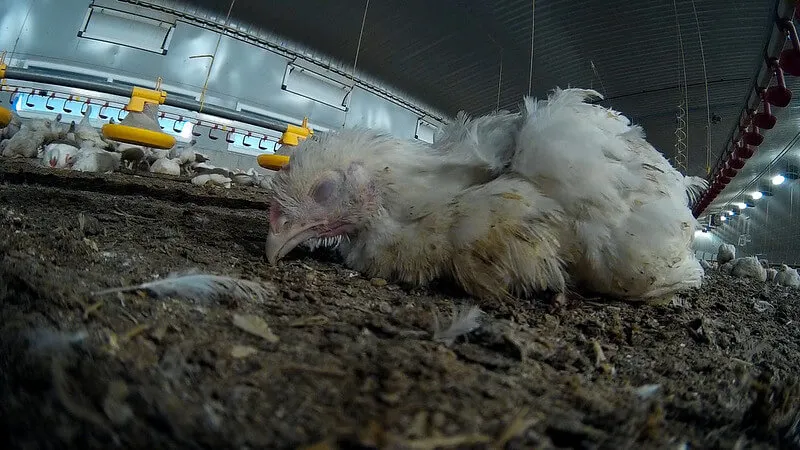
The government knows – and still, it does nothing
Decision-makers – including government and industry leaders – are not ignorant. They know exactly what’s happening inside these facilities. They’ve seen the footage, they’ve received our reports, and they’ve been presented with undeniable evidence. Yet, far too often, they choose to do nothing.
Over the past 13 years, Animal Equality UK has investigated over 50 farms and slaughterhouses, uncovering prolonged suffering, deliberate abuse, or outright illegal activity – every single time. Despite this, enforcement remains virtually nonexistent. Our report, in collaboration with The Animal Law Foundation, revealed that on average between 2018-2021:
- Fewer than 3% of the UK’s 300,000 farms (2.95%) are inspected.
- Only 0.33% of farms face prosecution following reports of non-compliance.
These findings were presented at a Parliamentary event that we hosted – marking the first of its kind – and was attended by MPs, government officials, and animal law experts.
The science is clear – factory farming breeds disease
Alongside our investigations, governments also have access to scientific advice from leading global institutions – advice that directly links industrial farming to pandemic risks.
Reports from the United Nations and the Intergovernmental Science-Policy Platform on Biodiversity and Ecosystem Services (IPBES) have long warned that intensive animal agriculture creates the perfect conditions for infectious diseases to emerge and spread.
The IPBES 2020 report makes this explicit:
“There is no great mystery about the cause of the Covid-19 pandemic, or of any modern pandemic,” said Peter Daszak, the chair of the group convened by the (IPBES) to produce the report.
“The same human activities that drive climate change and biodiversity loss also drive pandemic risk through their impacts on our environment. Changes in the way we use land; the expansion and intensification of agriculture; and unsustainable trade, production and consumption disrupt nature and increase contact between wildlife, livestock, pathogens and people. This is the path to pandemics.”
Similarly, the United Nations Environment Programme (UNEP) report, Preventing the Next Pandemic, identifies food systems as a major driver of disease emergence, with its number one recommendation being to ‘de-risk food systems’. The report outlines seven key human-driven factors behind zoonotic disease outbreaks, including:
- Increasing human demand for animal protein
- Unsustainable agricultural intensification
Just last week, the European Food Safety Authority (EFSA) and the European Centre for Disease Prevention and Control (ECDC) have reinforced these concerns. In their latest scientific opinion, they highlight how high-density farming, low biosecurity practices, deforestation, urbanisation, and global trade amplify the risk of disease spillovers from animals to humans.
A cycle of neglect and crisis
Despite this overwhelming expert evidence, governments are still not taking proactive steps to prevent future pandemics. In fact, instead of tackling the root cause, they are allowing the opposite – the rapid expansion of factory farms.
According to an analysis conducted by Compassion in World Farming, between 2016 and 2023 the number of UK factory farms increased by 12%. Even more concerning, large factory farms in pig and chicken units grew by 20% during this same period.
In the US, the situation is getting worse too. Research by Food & Water Watch found the number of factory-farmed animals grew by 97 million between 2017 and 2022. Now, there are 1.7 billion factory-farmed animals nationwide which produce more than double the waste of the entire US human population.
And in late 2023, North East Lincolnshire Council approved an entire new form of factory farming to open up in England. Recklessly, they agreed to grant permission to the UK’s first fully on-land salmon farm, setting a dangerous precedent, and putting animals, wildlife, human health and our local waterways at risk as a result. That’s why Animal Equality is taking the Council to court, to reverse this dangerous decision and stop the construction of this deadly mega-farm.
Instead of taking meaningful action to prevent disease outbreaks, governments and their local officials are doubling down on the root cause. So often they continue to hand taxpayer funds to subsidise factory farming and rely on short-term measures that fail to address the underlying issue, causing further harm to animals.
Animals do not need to be farmed for human consumption when there is an abundance of nutritious and delicious plant-based products available. These are thinking, feeling individuals, with personalities and the ability to feel pain. They do not want to die. Yet, due to the inaction of those in charge, they are now being punished even more by measures that try to contain the spread of diseases like H5N1, like planned mass culls.
What can you do
As of January 2025, the overall risk to public health is still considered low, with no confirmed cases of human-to-human transmission. However, the situation is changing rapidly. The spread of avian flu, coupled with the expansion of factory farming, means the risk of a future pandemic is only increasing.
The Government may not act. But you can. The best thing you can do right now is vote with your fork. Boycotting factory-farmed products and embracing a plant-based diet is one of the most powerful ways to prevent pandemics, protect animals, and defend global public health.
The change starts with you.
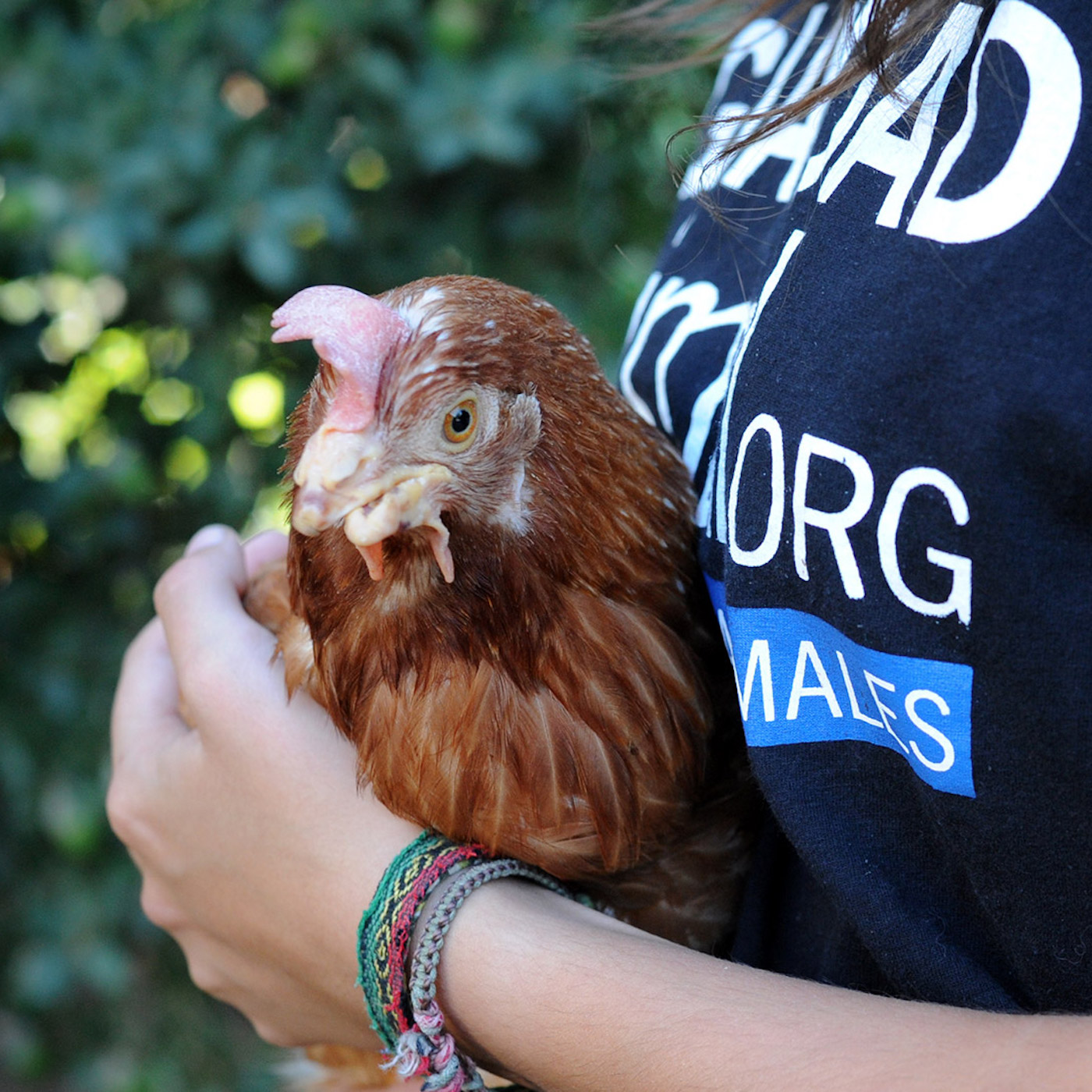
save animals, eat plant based
As a consumer, you hold the power to protect animals from the meat industry. Every plant-based meal saves animals from a life of misery in factory farms and slaughterhouses.



